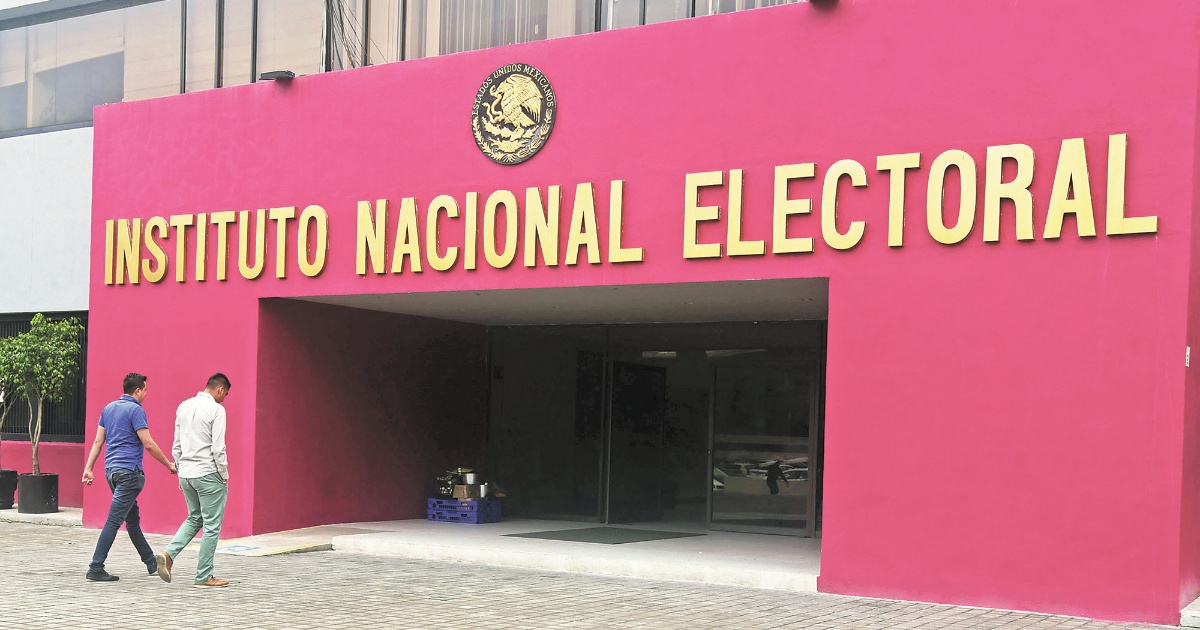The counselors of the National Electoral Institute (INE) unanimously expressed their rejection of the electoral reform (Plan B) that is being discussed in Congress, as they warned that it would cause serious risks to electoral operational capacity. They announced that to preserve the constitutional order, they will promote before the Supreme Court of Justice of the Nation (SCJN) all controversies, actions of unconstitutionality and amicus curiae that are necessary, in case the norm is approved.
At a press conference at the institute’s headquarters, accompanied by the directors Claudia Zavala, Ciro Murayama, Jose Roberto Ruiz Saldana, Uuc-kib Espadas, martin do y Jaime Riverathe president of the INE, Lorenzo Cordovaread a pronouncement on behalf of the 11 members of the General Council.
“Democracy is experiencing crucial moments: the approval of an eventual reform to the electoral laws could profoundly disrupt the electoral system that Mexico has built and perfected for more than three decades, and that today guarantees Mexican men and women free elections and renewal of public powers in conditions of legality, certainty, equity, public peace and democratic governance”, he said.
He called on legislators in Congress to carefully analyze the impacts of the proposed changes and allow electoral advisers to present all the technical information they require to make the best decisions.
Córdova Vianello listed six risky elements contained in the electoral reform bill, known as Plan B, which is supported by the president Andres Manuel Lopez Obrador:
- He indicated that the reform lacks the broadest consensus that must exist among political actors to guarantee its legitimacy.
- The proposed elimination of the 300 District Executive Boards would jeopardize not only the preparation of the Electoral Roll, the installation of polling stations and the counting of the votes, but also the timely monitoring of all radio and television stations in the country, oversight of the activities of political parties and electoral campaigns, and compliance with the obligations aimed at combating Political Violence against Women based on Gender, among other activities that the INE carries out at the district level.
- Eliminating the permanent sub-delegational structure of the INE and reducing the Electoral Professional Service to a minimum would prevent having qualified personnel as ordered by the Constitution, since the reform contemplates eliminating 84.6% of the positions that today make up said career civil service. “This measure jeopardizes the effectiveness and efficiency with which electoral processes are carried out and the attention in the modules where the Credential to Vote with Photography is processed.”
- The Constitution indicates that in the INE there will be management bodies, such as the General Council and, on the other hand, executive bodies. However, the reform eliminates the Executive General Board, which would be replaced by an Administration Committee made up of five directors, distorting their management function and involving them in ordinary administrative tasks such as resource management, which are outside their responsibility. management work. In addition, it incorporates that Commission into the Internal Control Body, which goes against its legal nature, which supposes only a supervisory function and not a substantive one.
- The workers of the National Electoral Professional Service reached their positions through recruitment procedures established by law, such as open public contests; they undergo an evaluation of their performance every year and are subject to a permanent education and training program, for which reason “stripping them from their jobs, when they have not committed any fault, but rather have delivered good accounts to citizenship, is to violate their labor rights. By constitutional mandate, both the personnel of the SPEN and those of the Administrative Branch, see their working conditions governed by the respective Statute. The reform contemplates that the workers attached to the Administrative Branch are no longer regulated by said Statute, thus affecting their general working conditions and labor guarantees, which violates their rights expressly established in the Magna Carta”.
- “The reform proposes the compaction of calendars and the alteration of procedures, some of them on highly sensitive issues, such as the selection of the officers of the Casilla Board of Directors who receive and count the votes of their neighbors. This alteration entails an affectation to the basic organic and procedural guarantees that, until now, have allowed free and authentic elections.
Córdova Vianello affirmed that the “electoral Plan B” violates the Constitution on many points, therefore, in order to preserve the constitutional order, in the event that the reform is approved by Congress, the INE will promote all controversies, actions of unconstitutionality and amicus curiae that are necessary before the Court. He affirmed that the INE is not in confrontation with anyone, with any government or party.
Questioned about whether they trust the SCJN, the president counselor endorsed the words pronounced in 2007 by the then minister Salvador Aguirre Anguiano when discussing the so-called Televisa Law: “The Minister, in front of those who suspected that the Court would succumb, said: they don’t know what the Ministers of the Court are made of.”
The councilor Uuc-kib Espadas questioned whether the reform promoted by the government will be able to avoid post-electoral conflicts, as the current electoral norm does.
“And the most optimistic answer we can give to that question is: we don’t know. And we don’t know because what is being done today is forcing to experiment, with a new and fragile structure, a presidential election (of 2024) that promises to be a difficult, tense and probably polarized election. Can anyone affirm that the new fragile structure will provide a service comparable to this one that has been tested over 8 years? Is this useful to those who aspire to occupy the Head of State in 2024? Can a candidate really prefer that their choice is made in this fragile, vulnerable system, which cannot fully guarantee the organic process, including the installation of the polling stations? Does any pre-candidate want today that the polls not be installed in their entirety as has happened? ”, She questioned.
Councilor Jaime Rivera opined that the proposed elimination of the 300 INE District Executive Boards, to make them temporary and mutilated, implies that the INE stops installing around 5,000 fewer polling stations in federal elections.
jorge.monroy@eleconomista.mx
hartford car insurance shop car insurance best car insurance quotes best online car insurance get auto insurance quotes auto insurance quotes most affordable car insurance car insurance providers car insurance best deals best insurance quotes get car insurance online best comprehensive car insurance best cheap auto insurance auto policy switching car insurance car insurance quotes auto insurance best affordable car insurance online auto insurance quotes az auto insurance commercial auto insurance instant car insurance buy car insurance online best auto insurance companies best car insurance policy best auto insurance vehicle insurance quotes aaa insurance quote auto and home insurance quotes car insurance search best and cheapest car insurance best price car insurance best vehicle insurance aaa car insurance quote find cheap car insurance new car insurance quote auto insurance companies get car insurance quotes best cheap car insurance car insurance policy online new car insurance policy get car insurance car insurance company best cheap insurance car insurance online quote car insurance finder comprehensive insurance quote car insurance quotes near me get insurance








